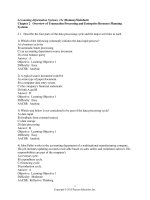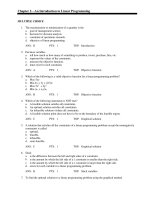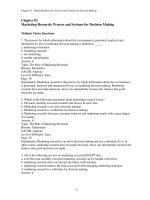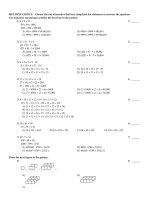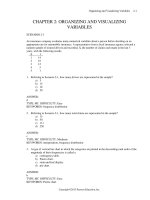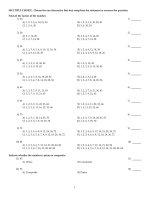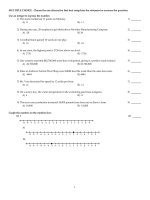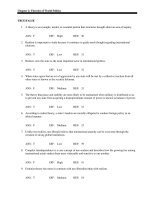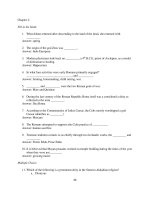Business law with UCC applications 13th edition brown test bank
Bạn đang xem bản rút gọn của tài liệu. Xem và tải ngay bản đầy đủ của tài liệu tại đây (270.42 KB, 54 trang )
Chapter 02
Sources of the Law
True / False Questions
1. The primary objective of law is to maintain harmony, stability, and justice within a
society.
True
False
2. Law should be viewed as a delicate balancing act.
True
False
3. Trade-offs occur within the law on a regular basis.
True
False
4. The language of the law helps in the execution of the law.
True
False
5. Duality in the law is not seen in the work of judges, legislators, and administrators.
True
False
6. The principle that states that intent and result never coincide, and when they do it
is generally a matter of luck is known as the uncertainty principle.
True
False
7. The Articles of Confederation created a strong national government.
True
False
8. The principle of the separation of powers divides power between the state and
federal government.
True
False
9. Article III of the U.S. Constitution gives executive power to the President.
True
False
10. The amendments to the U.S. Constitution are attempts to fine-tune the
Constitution and update its provisions to meet the demands of a changing
socioeconomic structure.
True
False
11. The Articles of Confederation set up the democracy.
True
False
12. The Eighth Amendment of the U.S. Constitution guaranteed jury trials in common
law cases.
True
False
13. The Constitution says that all federal laws that are made in line with constitutional
principles are to be considered the supreme law of the land.
True
False
14. The devolution of a right destroys the right.
True
False
15. A code is a compilation of all the statutes of the federal government.
True
False
16. The job of a drafting committee is to write the actual uniform law, point by point.
True
False
17. Common law is the body of previously recorded legal decisions made by courts in
specific cases.
True
False
18. Persuasive precedent is a precedent that a court must follow.
True
False
19. Judicial review is the process of determining the constitutionality of various
legislative statutes, administrative regulations, or executive actions.
True
False
20. Legislators are typically experts in the areas over which they have power.
True
False
Multiple Choice Questions
21. It is said that the law should be viewed as a delicate balancing act because:
A. political parties are competing for power.
B. individuals require restraint to prevent chaos.
C. one company's contract rights may be upheld at the expense of another's.
D. one company may overcharge consumers.
22. While one person has found the actual intent of the law, the other has missed its
true meaning. This duality in law is the balance between:
A. the spirit and the letter of law.
B. words versus interpretation.
C. the abstract and the concrete.
D. the uncertainty principle and reason.
23. The basic law of a nation or state typically is the:
A. common law.
B. power of the chief executive.
C. constitution.
D. legislation.
24. While living in Oregon, Lillian was accused of molesting several children in Idaho
five years earlier, where she had worked as a social worker. Lillian could be
brought back to Idaho for trial:
A. under the Uniform Commercial Code.
B. through persuasive precedent.
C. under the Third Amendment to the U.S. Constitution.
D. under Article IV of the U.S. Constitution.
25. Article III of the U.S. Constitution:
A. determines that a presidential term of office runs for six years.
B. states that Congress consists of the Senate and the House of Representatives.
C. provides for trial by jury for crimes.
D. establishes the principle of supremacy.
26. Which of the following Articles of the U.S. Constitution provides for the original
ratification of the Constitution.
A. Article I
B. Article III
C. Article VII
D. Article V
27. __________________ is the process by which the courts decide that a federal statute
must take precedence over a state statute.
A. Devolution
B. Revision
C. Uniformity
D. Preemption
28. _____________________ includes the freedom of the press, freedom of speech,
freedom of assembly, and freedom of religion.
A. The Bill of Rights
B. Modern Amendment
C. Articles of Confederation
D. The Federal Register
29. Laws passed by a legislature are known as _____
A. codes
B. titles
C. amendments
D. statutes
30. If Texas attempted to make a trade agreement with Mexico, opposed to the
Constitution that establishes tariffs and importing conditions for goods made in
Mexico, the U.S. Constitutional objection to Texas' actions would be based upon:
A. the principle of preemption.
B. the doctrine of devolution.
C. the principle of separation.
D. the principle of supremacy.
31. Codes subdivided into groupings of statutes that deal with a particular area of the
law are:
A. titles.
B. articles.
C. chapters.
D. divisions.
32. ______________________________ is a unified set of statutes designed to govern almost
all commercial transactions.
A. The Uniform Common Law Code
B. The Uniform Commercial Code
C. The Uniform Civil Code
D. The Uniform State Code
33. Which of the following refers to the body of previously recorded legal decisions
made by the courts in specific cases?
A. Statute
B. Amendment
C. Constitution
D. Common law
34. If there are no modern court decisions or statutes dealing with an issue in dispute,
the court hearing the case:
A. will apply common law.
B. will inevitably devolve.
C. will be unable to decide the case.
D. will ask the U.S. Supreme Court for an advisory opinion.
35. Typically, if a decision is made by the Florida Supreme Court, it would be:
A. persuasive in some Florida states courts.
B. binding in all Florida state courts.
C. binding in all other state courts.
D. persuasive in all Florida states courts.
36. A business asks a court to interpret the way in which newly enacted shoplifter
detention legislation will be applied if the business, at some future point, detains a
suspected shoplifter. The court may:
A. issue an advisory memorandum.
B. convene a conference of business and consumer representatives.
C. not interpret the statute until faced with a case.
D. ask the legislature to issue an advisory memorandum.
37. _______________ is the process by which the courts analyze those aspects of a
statute that are unclear and ambiguous or that were not anticipated at the time
the legislature passed the statute.
A. Judicial review
B. Statutory interpretation
C. Devolution
D. Preemption
38. A new administrative regulation allowed the Social Security Administration to
charge women for Social Security cards yet enabled men to obtain the cards for
free. This regulation was contradictory to the constitution. Hence the U.S. Supreme
Court is likely to:
A. review common law to see whether a precedent exists.
B. use statutory interpretation to clarify the law.
C. rule the regulation as unconstitutional.
D. let the regulation stand.
39. The process of determining the constitutionality of various legislative statutes,
administrative regulations, or executive actions is:
A. preemption.
B. statutory interpretation.
C. devolution.
D. judicial review.
40. Once a rule is finalized, it is included in the _____________________.
A. Administrative Register
B. Code of Federal Regulations
C. Uniform Commercial Code
D. Modern Federal Register
Essay Questions
41. Stanley runs a business in Middletown. He knows bribing an officer in return for
favorable duties is a crime. However, he avoids ‘bribery' by sending only ‘gifts' to
the sheriff as a token of appreciation of the officer's services to the town. The
sheriff is impressed by Stanley's act and ensures that his business is ‘well
protected'. Analyze the situation.
42. Pierce was arrested under a city ordinance that made distributing handbills on the
city streets a crime. Pierce argued that the U.S. Constitution guaranteed his right to
free speech under the First Amendment. The local prosecutor argued that the First
Amendment to the U.S. Constitution did not apply to state laws. Was the
prosecutor correct? Explain.
43. Matrix Corp. is fined by the Occupational Safety and Health Administration for
violations of workplace safety regulations. Matrix challenges the fine on the basis
that it was not allowed to have a jury trial before being fined. Discuss.
44. A state law restricts the sulfur dioxide emissions from electric generation plants
more severely than those of the federal Clean Air Act. Must an electric generation
plant obey the state law or may it follow the federal statute?
45. A court decides that a state agency, rather than a federal one, can control what
governmental employees, in the course of performing their duties, are permitted
to talk or write about in relation to official policies, procedures, and programs.
Such a prohibition might appear to violate the employee's Constitutional right of
free speech as a U.S. citizen. Analyze.
46. Small towns want to restrict the speed of trains passing through the town to 20
miles per hour. The Federal Railroad Administration allows trains to travel through
the towns at upto 70 miles per hour. Discuss whether or not the towns may restrict
the speed of the trains.
47. A local city council enacts an ordinance that prohibits aircraft from taking off
before 7:00 A.M. and disturbing the city's residents. An airline whose schedule is
subject to federal regulation challenges this ordinance. Discuss the legal basis of
this challenge and the likely outcome.
48. A Massachusetts law prohibited governmental agencies of Massachusetts from
buying goods from companies that conducted business with Myanmar. On what
basis can this law be struck down by the Supreme Court of the United States?
49. In a case presented to the Philadelphia Court, the judge and the jury realize that
no specific statute is applicable and decide to refer to previously recorded legal
decision made in similar cases. Discuss.
50. Helen, a 15-year-old citizen of Illinois, was about to go to the doctor for an
abortion when the Supreme Court of Michigan ruled that minors could not receive
an abortion without parental consent. What effect might the Michigan Supreme
Court's decision have on Helen?
Chapter 02 Sources of the Law Answer Key
True / False Questions
1.
The primary objective of law is to maintain harmony, stability, and justice within
a society.
TRUE
The law consists of rules of conduct established by the government of a society
to maintain harmony, stability, and justice.
AACSB: Ethics
Blooms: Remember
Difficulty: 1 Easy
Learning Objective: 02-01 List the objectives of the law.
Topic: The Purpose and Operation of the Law
2.
Law should be viewed as a delicate balancing act.
TRUE
The law should be viewed as a delicate balancing act.
AACSB: Ethics
Blooms: Remember
Difficulty: 1 Easy
Learning Objective: 02-01 List the objectives of the law.
Topic: The Purpose and Operation of the Law
3.
Trade-offs occur within the law on a regular basis.
TRUE
One person is allowed to go free while another is imprisoned, fined, and forced
to forfeit his property. One corporation's contracts are upheld while another's
are struck down. Trade-offs like this occur within the law on a regular basis.
AACSB: Ethics
Blooms: Understand
Difficulty: 2 Medium
Learning Objective: 02-01 List the objectives of the law.
Topic: The Purpose and Operation of the Law
4.
The language of the law helps in the execution of the law.
FALSE
Because words are often ambiguous, the language of the law can become a
hindrance rather than a help in the execution of the law.
AACSB: Ethics
Blooms: Understand
Difficulty: 1 Easy
Learning Objective: 02-02 Clarify the duality of the law.
Topic: The Purpose and Operation of the Law
5.
Duality in the law is not seen in the work of judges, legislators, and
administrators.
FALSE
Duality in the law is also seen in the work of judges, legislators, and
administrators.
AACSB: Ethics
Blooms: Understand
Difficulty: 2 Medium
Learning Objective: 02-02 Clarify the duality of the law.
Topic: The Purpose and Operation of the Law
6.
The principle that states that intent and result never coincide, and when they do
it is generally a matter of luck is known as the uncertainty principle.
TRUE
The two, intent and result, almost never coincide, and when they do it is
generally a matter of luck, nothing more. This principle, which is generally
referred to as the uncertainty principle, exists in physics, in politics, and in
economics.
AACSB: Ethics
Blooms: Remember
Difficulty: 1 Easy
Learning Objective: 02-02 Clarify the duality of the law.
Topic: The Purpose and Operation of the Law
7.
The Articles of Confederation created a strong national government.
FALSE
The Articles of Confederation were created to hold together a fragile coalition of
states, each of which was determined to maintain its own independent
existence.
AACSB: Ethics
Blooms: Understand
Difficulty: 2 Medium
Learning Objective: 02-02 Clarify the duality of the law.
Topic: The Purpose and Operation of the Law
8.
The principle of the separation of powers divides power between the state and
federal government.
FALSE
The principle of the separation of powers set up the now familiar three branches
of the national government: the executive branch, the legislative branch, and the
judicial branch. The principle of checks and balances allows each branch to
share in the power of the other two branches.
AACSB: Ethics
Blooms: Remember
Difficulty: 1 Easy
Learning Objective: 02-02 Clarify the duality of the law.
Topic: Constitutional Law
9.
Article III of the U.S. Constitution gives executive power to the President.
FALSE
Article III gives judicial power to the Supreme Court and other courts established
by Congress.
AACSB: Ethics
Blooms: Remember
Difficulty: 1 Easy
Learning Objective: 02-03 Outline the content of the U.S. Constitution.
Topic: Constitutional Law
10.
The amendments to the U.S. Constitution are attempts to fine-tune the
Constitution and update its provisions to meet the demands of a changing
socioeconomic structure.
TRUE
the amendments are attempts to fine-tune the Constitution and update its
provisions to meet the demands of a changing socioeconomic structure.
AACSB: Ethics
Blooms: Understand
Difficulty: 2 Medium
Learning Objective: 02-03 Outline the content of the U.S. Constitution.
Topic: Constitutional Law
11.
The Articles of Confederation set up the democracy.
FALSE
The Articles of Confederation did not set up a democracy. From the very first
statement to the very last sentence, the Articles expressly support state
supremacy.
AACSB: Ethics
Blooms: Understand
Difficulty: 2 Medium
Learning Objective: 02-03 Outline the content of the U.S. Constitution.
Topic: Constitutional Law
12.
The Eighth Amendment of the U.S. Constitution guaranteed jury trials in
common law cases.
FALSE
Article III gives judicial power to the Supreme Court and other courts established
by Congress.
AACSB: Ethics
Blooms: Remember
Difficulty: 1 Easy
Learning Objective: 02-03 Outline the content of the U.S. Constitution.
Topic: Constitutional Law
13.
The Constitution says that all federal laws that are made in line with
constitutional principles are to be considered the supreme law of the land.
TRUE
The Constitution says that all federal laws that are made in line with
constitutional principles are to be considered the supreme law of the land.
AACSB: Ethics
Blooms: Remember
Difficulty: 1 Easy
Learning Objective: 02-03 Outline the content of the U.S. Constitution.
Topic: Constitutional Law
14.
The devolution of a right destroys the right.
FALSE
It is important to note that the devolution of a right does not destroy that right.
Rather, devolution simply redistributes the authority to define the nature of that
right in certain situations.
AACSB: Ethics
Blooms: Remember
Difficulty: 1 Easy
Learning Objective: 02-04 Explain several central constitutional principles and powers.
Topic: Constitutional Law
15.
A code is a compilation of all the statutes of the federal government.
TRUE
A code is a compilation of all the statutes of a particular state or the federal
government.
AACSB: Ethics
Blooms: Remember
Difficulty: 1 Easy
Learning Objective: 02-05 Explain the role of statutory law in the legal system.
Topic: Statutory Law
16.
The job of a drafting committee is to write the actual uniform law, point by
point.
TRUE
The job of the drafting committee is to write the actual uniform law, point by
point.
AACSB: Ethics
Blooms: Remember
Difficulty: 1 Easy
Learning Objective: 02-06 Defend the need to set up a system of uniform laws.
Topic: Statutory Law
